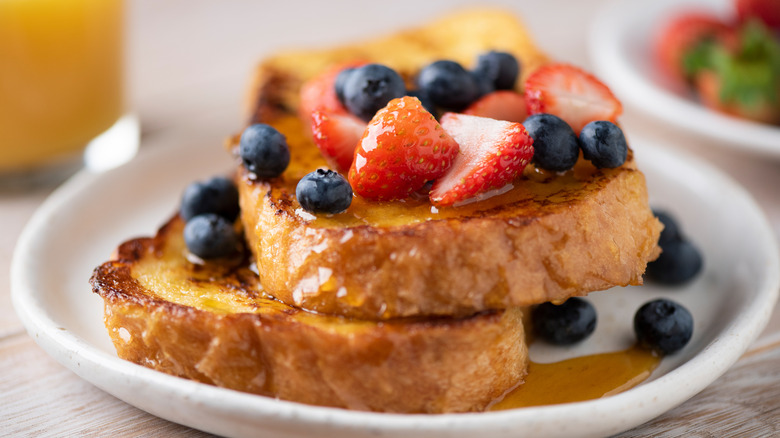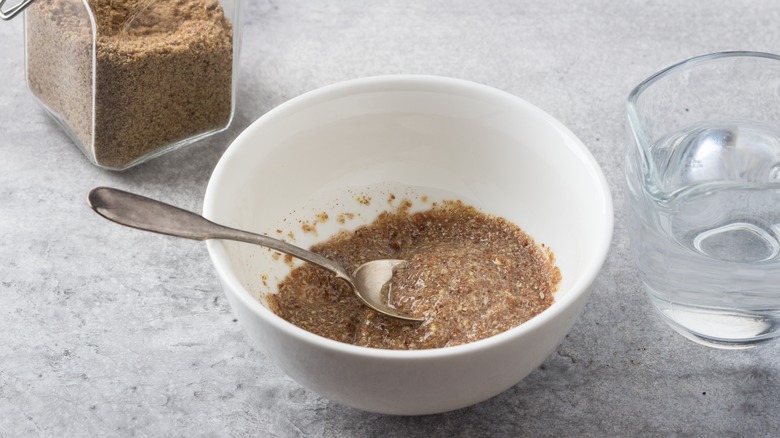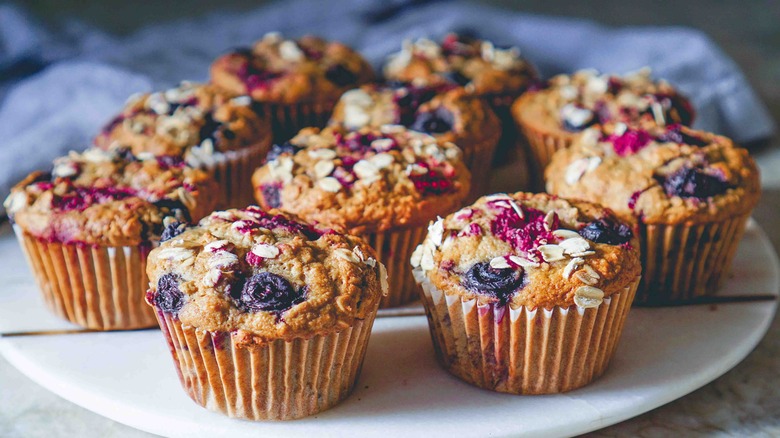Flaxseed Is Your Secret Ingredient For Delicious Vegan French Toast
Vegans don't have to miss out on a comforting Sunday morning plate of French toast on account of eggs. It's still possible to retain the soft, custardy center and caramelized exterior of classic French toast without them — or milk and butter from a cow, for that matter. When ground and mixed with water, flax seeds provide an egg replacement so spot-on it might even win over the egg purists at your brunch table.
Known among vegan and egg-intolerant circles as a flax egg, the concoction couldn't be simpler to make at home. For every egg needed in your recipe, mix a tablespoon of ground flax seeds and 2½ to 3 tablespoons of water, letting it sit until it starts to congeal. It's such a tried-and-true alternative that when it comes to using flax eggs to make vegan French toast, professional chefs — even non-vegan ones, like Cornbread and Kimchi founder LaMara Davidson, who recommended the technique to Martha Stewart readers — approve of the swap. Still, there are some important things to keep in mind to get the most out of this method.
Small but mighty adjustments
There are a couple of steps you can take to level up your egg-less French toast and make it extra foolproof. To achieve that coveted fluffy interior and crispy exterior while keeping things vegan, bolster your flax egg with a little cornstarch. Often used as an egg replacement on its own, the powdered pantry staple acts as a thickening agent, helping to keep the inside nice and soft while enabling the crust to get nice and browned. Another vegan egg substitute that works well with flax and similarly promotes both tenderness and browning is aquafaba, the liquid left over from cooking legumes (particularly chickpeas).
As for your bread, don't be afraid to veer from tradition. Popular French toast varieties like brioche and challah are made with eggs, which won't do for vegans, but it's just as well — thick slices of sourdough work even better for vegan French toast. Since flax eggs yield a looser batter than traditional French toast, finer crumbs can quickly turn soggy. Likewise, your flax-soaked slices might need a little extra time in the pan to cook through.
Beyond the toast
Of course, flaxseed is incredibly versatile. Beyond using a flax egg to mimic the custard in conventional French toast, you can also blend the ground seeds with some coconut oil and maple syrup to make a rich, spreadable vegan maple butter in place of the more conventional sappy stuff.
Unfortunately, flax eggs don't always work as a substitute for egg-centric dishes like scrambled eggs or omelets since they don't bind to other ingredients or firm up quite as well as chicken eggs. Still, they're great to keep in your back pocket — not literally; that would be very messy — for sweet brunch spreads and simple baked goods. In addition to French toast, flax eggs work wonders in vegan muffins, pancakes, banana bread recipes, scones, brownies, fritters, and even meatless meatballs. The possibilities might not be endless, but they're certainly vast enough to inspire a healthy turnout at a vegan bake sale.
If you don't like flax seeds or you can't find them at the store, chia seeds make a great backup option. Follow the same ratio as you would with flax eggs and wait a few minutes for the seed-and-water mixture to form into a wiggly jelly.


